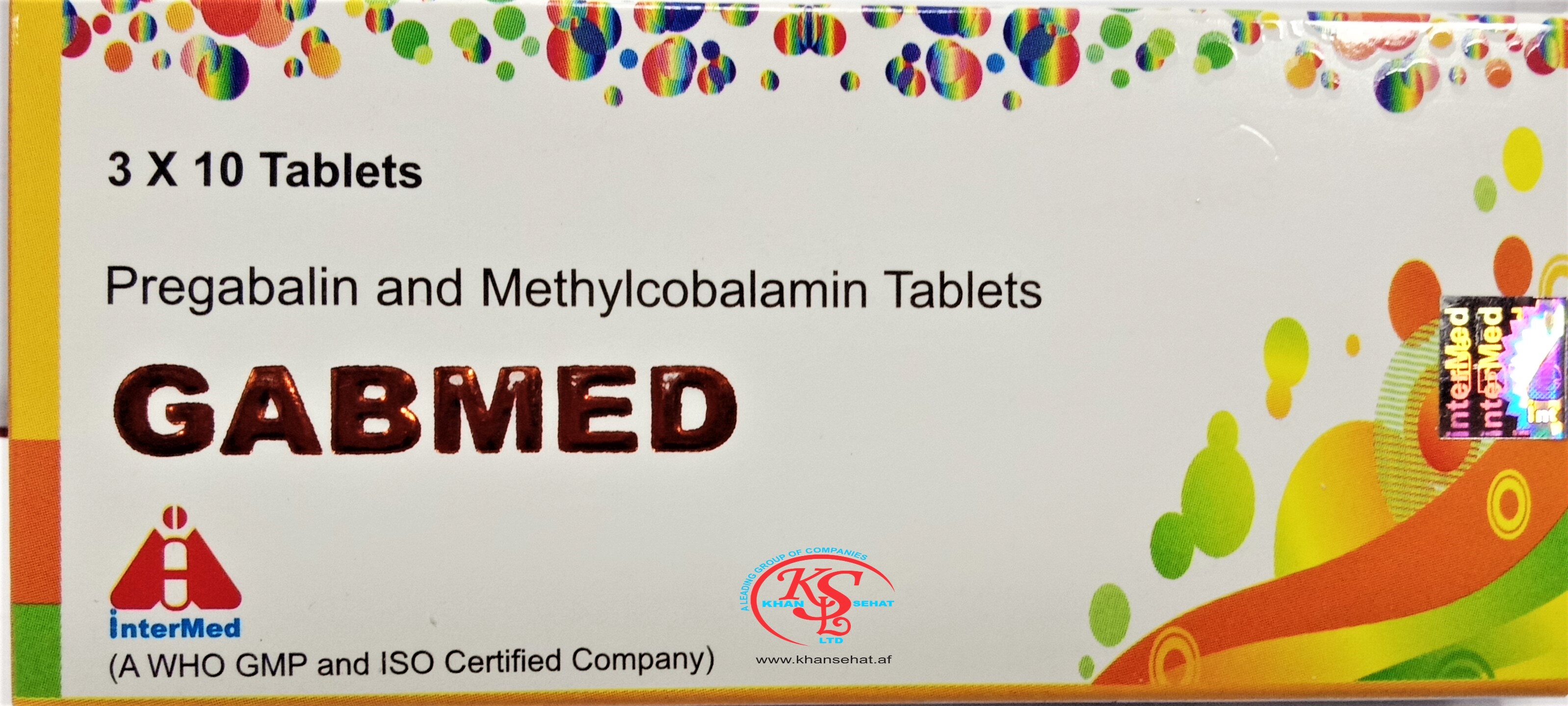PRESENTATION NO 004 : GABMED Relieves Pain (Pregabalin 75mg + Methylcobalamin 750mcg) Revives Neurons

GABMED
Relieves Pain
(Pregabalin 75mg + Methylcobalamin 750mcg)
Revives Neurons
INTRODUCTION
Pregabalin is classified as a miscellaneous analgesic and anticonvulsant.
Pregabalin is structurally related to Gabapentin.
Therapy in the treatment of partial seizures in adults and pediatric patients (3-12 years of age) and also approved in 2002 for pain management of PHN in adults.
An extended-release.
INDICATIONS
Neuropathic pain associated with diabetic peripheral neuropathy.
Neuropathic pain associated with postherpetic neuralgia.
Adjunctive therapy for adults with partial onset seizures.
Adjunctive therapy for partial seizures with or without secondary generalization in patients older than 12 years of age with epilepsy.
Adjunctive therapy in partial seizures in pediatric patients 3-12 years of age.
PHARMACOLOGY
Pregabalin is a structural derivative of the inhibitory neurotransmitter gamma-aminobutyric acid (GABA).
However, it does not directly bind to GABA receptors.
Pregabalin binds to the alpha2-delta site of voltage-gated calcium channels in the central nervous system (CNS) tissues.
This calcium channel modulation may reduce the release of many neurotransmitters.
The manufacturer states that 50 mg of pregabalin is approximately equal to 300 mg of gabapentin.
DOSAGE
Adult dosage (ages 18–64 years)
Typical starting dosage: 50 mg taken three times per day.
Maximum dosage: 100 mg taken three times per day.
Dosage for fibromyalgia
Adult dosage (ages 18–64 years).
Typical starting dosage: 75 mg taken two times per day.
Maximum dosage: 450 mg per day.
PHARMACOKINETICS
The peak oral concentration of pregabalin occurs after 1.5 hours with bioavailability being greater than 90% and independent of the dose.
However, food does decrease the peak plasma concentration by 25% to 30% and increases the time-to-peak plasma concentration to approximately 3 hours.
PREGABALIN SIDE EFFECTS
Pregabalin oral capsule can cause:
Dizziness.
Sleepiness.
Blurry vision.
It may affect your ability to think, see, or move.
You shouldn’t drive, use machinery, or do other tasks that require alertness until you know how this drug affects you.
MORE COMMON SIDE EFFECTS
Dizziness.
Sleepiness.
Trouble concentrating.
Blurry vision.
Dry mouth.
Weight gain.
Swelling of your hands or feet.
INTRODUCTION
Methylcobalamin is one active form of vitamin B12 which can directly participate in homocysteine metabolism.
It is used to treat some nutritional diseases and other diseases in clinic, such as Alzheimer's disease and rheumatoid arthritis.
Methylcobalamin is a form of vitamin B12.
Vitamin B12 is important for the brain and nerves, and for the production of red blood cells.
IMPORTANT AND USES
Methylcobalamin is a form of vitamin B12.
Vitamin B12 is important for the brain and nerves.
Production of red blood cells.
Methylcobalamin has been used as a supplement in patients with vitamin B12 deficiency and in those with diabetes and other neuropathies.
Although use in dementia is advocated, aside from correcting deficiencies, clinical trials are limited.
BEFORE TAKING THIS MEDICINE
Leber's disease or other form of optic nerve damage.
An iron or folic acid deficiency.
Low levels of potassium in your blood.
DOSAGE
The Dietary Reference Intake (DRI, also known as Recommended Daily Allowance [RDA]) for vitamin B12 is 2.4 mcg/day.
Clinical trials with specific dosage recommendations for methylcobalamin are lacking.
Dosage is based on recommended dosages for vitamin B12.
High dosages of methylcobalamin (1,500 mcg/day orally) have been used in limited studies.
METHYLCOBALAMIN SIDE EFFECTS
Get emergency medical help if you have signs of an allergic reaction:
Hives.
Difficult breathing.
Swelling of your face, lips, tongue, or throat.
Common side effects may include:
Nausea.
Vomiting.
Diarrhea.
Loss of appetite.
Headache.
DRUGS WILL AFFECT METHYLCOBALAMIN?
Chloramphenicol.
Colchicine.
Antibiotic medicine
Oral diabetes medicine that contains metformin.
Medicines that reduce stomach acid such as
Cimetidine.
Omeprazole.
Lansoprazole.
Nexium.
Prevacid.
Prilosec.
Zantac.
Manufactured By: interMed
Marketed By: KHAN SEHAT LTD
Presented By: Dr. Anwarullah Ayarkhail







